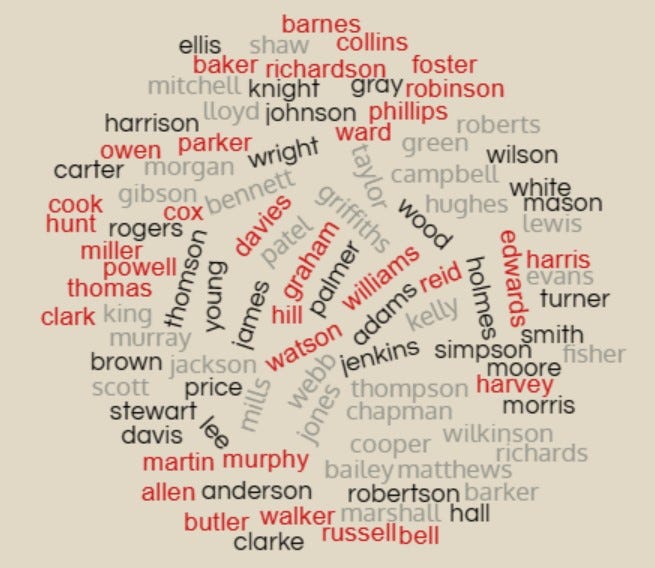Families holding hereditary names first started amongst the elite of society before gaining popularity further along the social scale.[1] The precise reasons for this practice emerging are elusive but it was adopted across western Europe in the medieval period. It may have emerged early in Ireland where people were often known by their personal name and a (non-hereditary) by-name. Following their conquest of England, Norman barons adopted the names of their estates for hereditary names. This link with property produced an early form of surname which was later followed by others.
The narrow range of personal names favoured by the Normans may be considered a factor in the development of a further name to distinguish individuals from one another. The increase in written records from the twelfth to the fourteenth centuries may also have contributed to the use of hereditary surnames, so that continuity of land ownership could be established.[2] It is possible the large number of surnames which are derived from farmsteads originated this way. However, medieval scribes were content to record people using their father as an identifier, so this is not a complete explanation. Neither can land explain how by-names derived from nicknames or from occupations became surnames carried by descendants who did not share these characteristics.
Names on filing cards.
Surnames became established through a long and complicated process. They were first adopted in southern England and East Anglia between the second half of the thirteenth century and the first half of the fourteenth. It took another century for the practice to become common across northern England and Lowland Scotland. By the fifteenth century, most people in Britain had hereditary surnames. Welsh names did not take the English form until the sixteenth century.
Surnames can be divided into broad classes depending on their origin such as nicknames, relational, locative and topographical, and occupational.
Many by-names used in the later medieval period never developed into surnames. Records show that people were often known by multiple by-names during their lives. Many of the surnames which emerged in the medieval period have since disappeared through failure of the male line. Especially those of single-family origin. The stock of surnames has increased however, both through immigration and the corruption of original names into various forms, especially with phonetic spelling.
Surname word-cloud.
In Britain, the academic study of surnames has been particularly strong. The English Surnames Survey at the University of Leicester has published county studies concerned with etymologies, distribution and how some names have ramified over time. One of the findings of the Survey is that a decline in the number of different surnames at the end of the medieval period was followed by a period of population growth into the early seventeenth century and the spread of family names within a restricted neighbourhood. Surnames once borne by a single family ramified to include several households. These names did not, on the whole, migrate far so in the early modern period certain surnames became characteristic of particular areas. Despite mobility in recent centuries, there remain characteristic regional surnames across Britain.
Surnames are useful tools in the study of population movement and the stability of groups of core families. They can be an important aspect in local histories. For family historians surnames are crucial, leading to close attention. Their usefulness and interest can even steer the researcher to carry out a one-name study on a particular surname, especially if it is an unusual one.
References and Resources:
Information for this post was taken from the excellent David Hey (ed.), The Oxford Companion to Local and Family History (1996), 428-9.
R. A. McKinley, A History of British Surnames (2015)
William Lewis, What's in Your Surname?: The Fascinating Story of British Surnames (2014)
P. H. Reaney and R. M. Wilson, A Dictionary of English Surnames (1991)
P. Hanks and F. Hodges, The Oxford Dictionary of Surnames (1989)
E. MacLysaght, The Surnames of Ireland (1980)
G. F. Black, The Surnames of Scotland, Their Origin, Meaning and History (1946)
T. J. and P. Morgan, Welsh Surnames (1985)
Guild of One-Name Studies: Modern British Surnames
[1] David Hey (ed.), The Oxford Companion to Local and Family History (1996), 428
[2] Ibid.






